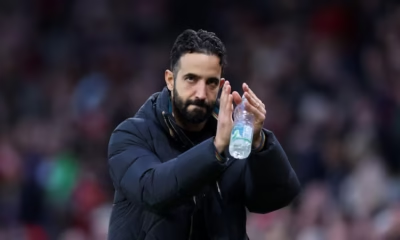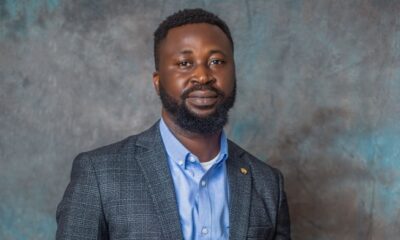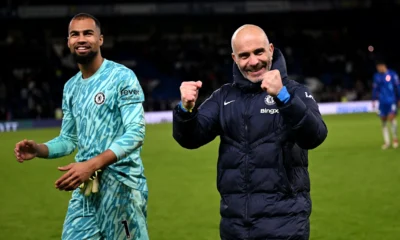NEWS
How I graduated with first-class despite being in love – Agbelusi reveals

Agbelusi Damilola, a twenty-year-old lady graduated with a first-class degree from the Department of Economics at Babcock University, Illishan-Remo, Ogun State in the 2018/2019 academic session where she had 4.596 CGPA. In this chat with TUNDE AJAJA, she talks about her experiences as an undergraduate. Enjoy!
There is sometimes a nexus between childhood experiences and school performance. Do you still recall some of the notable events that characterised your growing up?
They are evergreen in my memory. My dad is a teacher and so in my primary and secondary schools, he taught me Mathematics, English and Quantitative Reasoning every summer break. I remember learning Further Mathematics at a very tender age and this drastically improved my proficiency in Mathematics. I also remember that in secondary school, I used to make some early morning presentations at the assembly ground and fortunately, that helped my public speaking skills as much as it helped to improve my self-confidence. I thank my dad for the things he taught me because they later formed a solid background for me academically. In my previous schools, I was a star girl. I represented my secondary school in inter-school competitions such as Cowbell Mathematics Competition, Olympiad Mathematics and two literature competitions. I was also the best student in the Humanities Department for three consecutive years and I was the valedictorian in my set; 2015 graduating class. I won so many awards in secondary school and even won an external award as the most hard-working student in my school. I didn’t sweat too much for my West African Senior School Certificate Examination and the Unified Tertiary Matriculation Examination because my secondary school teachers organised lessons for us after school hours and they really impacted knowledge in us. Luckily, I took these exams in one sitting. By the grace of God, I didn’t have any delay in getting admission. I graduated from secondary school in July 2015 and secured admission the following month.
Would you say your background also influenced the choice of your course?
As a child, I wanted to be a lawyer and I had the backing of my parents to do that. The fact that lawyers were seen as people who cared about justice, equity and fairness made me love the profession at first, but later, I realised that there was more to studying law, especially the duration of the course and other things. These made me review my interest in it and I partially lost interest in law, basically. I believe there are stages when we have to change our interests and I would say I prefer where I am now.
When you changed your mind about law, what attracted you to Economics?
When I was in Senior Secondary School 3, my Economics teacher advised me to do the appropriate course that would fit my ability, given that I was really good in Mathematics and Economics. Then, I checked out the course outline for Economics at Babcock University and realised that it was a course I could handle so well, plus the course duration was four years. That was when I decided to go for it and to be honest; I have no regrets at all. It is one course that explains how the world works. What fascinates me the most is that it can be applied to everything because it is all about how we make choices. The fact that one can forecast or make predictions through proper analysis made it very interesting for me.
Since you already had an interest in the course, did that make it easy for you to graduate with a first-class degree?
It was from my secondary school days that I planned that I would graduate with a first-class degree. That had always been my priority. So, yes, the interest I had developed for the course made graduating with a first-class degree easier for me and it prompted me to give my best always. Not that it was an easy ride; nothing good comes easy, but by the grace of God, my work towards graduating with a first-class degree started from my first year. I started with 4.50 GPA.
Knowing that not everyone in your class graduated with a first-class degree, what were the things you did differently from others to have such an outstanding result?
I would not say I was more hard-working than the others, and I was not more focused than them. I would tie it to the grace of God.
How would you have felt if you had not graduated with a first-class degree?
To be honest, I would have felt incompetent.
In your four years as an undergraduate, do you still recall your most memorable moments in school?
Yes, and I would start with my happiest moment. That was when I first won an award for academic excellence in 2016. I was really happy because it was like a testament to the hard work I had put in. On the other hand, the most embarrassing moment I had was when I scored one out of 15 in one of my courses; principles of finance mid-semester test. It was just too embarrassing and it just stuck in my mind.
Were there things you would have loved to do but had to let go of because of your studies?
Yes, I wanted to be a campus ambassador for Unilever in my school. I did not follow up because I felt I might not be able to merge the responsibilities attached to that with my studies, which was my priority. So, I had to let it go. I believe we are a product of our choices. I never wanted to be an average student and I strongly detest failure and mediocrity, so I had to constantly read, including the materials I downloaded.
For the sake of students that are still in school, what was your typical day like?
It was always stressful, especially on days when we had mid-week services in church, but usually, my movement was from classes to cafeteria then to church, if there was service, then to the library and back to my hostel. It was more like having a mental note of my daily routine. I only did little on public holidays. I made sure I studied for at least eight hours every day and during that exercise, it was a thorough reading pattern and I always made sure I jotted things down and also used diagrams to make complex sentences easier for me to understand subsequently. I also used the library very often. As a matter of fact, I had my favourite spot on the last floor of the library.
Were there times you were bored as an undergraduate, maybe due to the rules and routine activities in some private universities?
In my own perspective, private schools are not boring at all. At least, there are few social events that take place on campus. The truth about private schools is that they have the priority of providing holistic education, which is the delivery of a combination of spiritual, moral, social and academic teachings.
Apart from books, would you say you were sociable or was it all about your books?
Actually, I was not really sociable. I was much more concerned about my books but I engaged in some volunteering activities by joining the Trendz Club. Usually, I used my leisure to hang out with my friends and prepare new kinds of food.
Were your parents the type to reward their children for good performance?
Yes, and they did that so many times. My mum took me on a trip to Dubai recently to reward me for my school performance. In 2015, my dad gave me N20,000 for being the valedictorian in my secondary school. I actually used the money to buy a smartphone, which was N18,000 at that time.
From the much you have learnt, if you are to advise the government, what would be your recommendations?
For the state government, I would recommend that a conscious and justifiable effort should be made to promote the effectiveness of revenue collection. Hence, revenue collection should not be based on taxes alone. There should be diversification of the state revenue. For the Federal Government, there should be an investment in human capital development because the greatest component of a country is ‘the people’ and the empowerment of these people in different forms will help to grow the economy and reduce the poverty level on the long run. Also, there should be a boost in power generation across the country. Constant electricity would help small industries to survive and it will also increase foreign investment in Nigeria, which would help to reduce the level of youth unemployment.
No doubt, Economics is a course with a wide application, where would you like to work?
I wish to work with the Research Department of the Central Bank of Nigeria.
If you have the opportunity to lead this country for a day, what major economic decisions would you make or propose?
If I was given the opportunity to lead this country for a day, I would give foreign investors tax holiday so that they can set up manufacturing plants in Nigeria. This will help to increase Foreign Direct Investment and reduce the high rate of unemployment. To achieve this, foreign investors would be granted five years unencumbered tax and regulatory holiday.
In all of the problems facing Nigeria, which of them bothers you the most?
The problem of unemployment bothers me the most. This is because high unemployment leads to an increased crime rate, which affects the citizens and the reputation of the country in the international community. The unemployment problem is so serious that to even get internship placement could be very difficult. It took a while before I got one but I thank God that I secured one with Stanbic IBTC, which is where I am now.
What are your future plans and aspirations?
I want to be a quantitative financial analyst. To achieve this, I plan to have a master’s degree in Quantitative Finance (Mathematical Finance), take my CFA (Chartered Financial Analyst) exams and have a post-doctoral degree in Econometrics from an Ivy League school like Harvard University. I intend to have a firm that specialises in mobile and web payment systems for e-commerce companies. This will be established in Nigeria in order to promote financial inclusion across Nigeria and even in Africa.
It is believed that men love to associate with intelligent women; have you noticed this?
Yes! This is so apt. I met men of good standards, ambition and ethics who associated with me because of my academic excellence and intelligence. The only disturbing issue I encountered came when one of them wanted to marry me and I had to decline because marriage wasn’t a priority for me then.
In your view, would you say being in a relationship is a distraction for undergraduates?
I think it depends on the individuals. For me, I didn’t see it as a distraction.
Were you in a relationship?
Yes, I was in a relationship and it didn’t affect us in any way. I believe people should know themselves and stick to what works for them.
What do you think students should do to have excellent results?
I think students should learn the act of studying outside the classroom. I mean, lecturers will not teach everything, therefore, it is pertinent for students to search for useful materials online that would make them more knowledgeable in that course. Also, students should not wait till the last minute before they read. Reading should be a routine exercise for them. Lastly, students should be resilient, focused, determined and they should persevere in order to have excellent results. However, the place of God is important; we are only humans trying to find suitable road maps to our greatness in this world. Thus, we are incomplete without God in our lives. My journey in the university was totally by the grace of God and I implore every student to put their trust in Him while they do their best and God will definitely crown their efforts with success.







